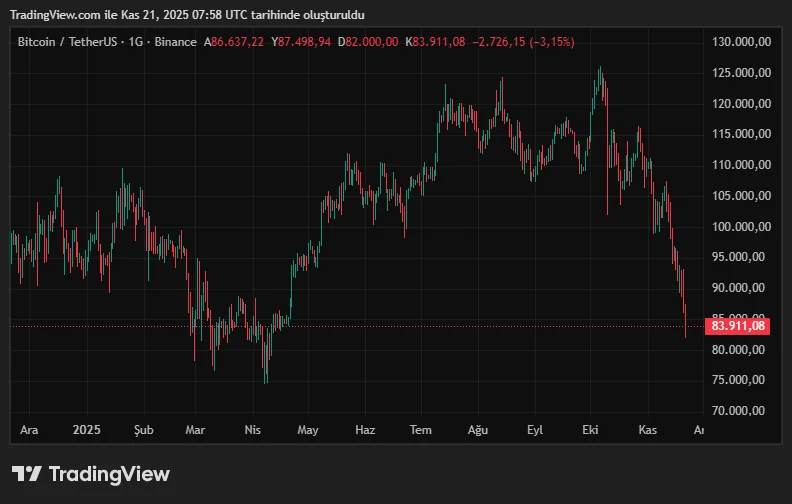Bitcoin fell below $84,000 on Friday morning, retreating to its lowest level in seven months. Delayed US employment data showed that inflationary pressures were still strong, weakening expectations for a December interest rate cut. The market was already operating on fragile ground; this data accelerated the sell-off and reinforced the "extreme fear" sentiment in the crypto market.
The BTC price fell over 7% in 24 hours, falling to $83,930. These levels represent a nearly 32% correction from the October peak of $126,080. The Crypto Fear and Greed index, hovering around 11 points, suggests a sharp deterioration in investor sentiment. The broader market also reflects the same picture; the total crypto market fell more than 6% in the last 24 hours.

Vincent Liu, CIO of Kronos Research, says the selling pressure is fueled not only by macro uncertainty but also by a lack of liquidity. According to Liu, the strong employment data disrupted the pricing of the expected December interest rate cut; short-term profit-taking accelerated the decline. The analyst emphasized that the Fed's suspension of tightening measures alone will not be sufficient for a sustainable recovery, emphasizing the need for capital inflows, on-chain demand, and a recovery in risk appetite.
The US nonfarm payroll data for September showed an increase of 119,000. Market expectations were only 50,000. The strong data contradicted previous signals of weakening employment and pointed to persistent inflationary pressure. According to the CME FedWatch Tool, the probability of a 25 basis point cut in December hovers around 35%. This rate suggests that market confidence in a rate cut remains weak.
Bitcoin ETFs "Near Record" Outflow
Another factor in the market's pressure was the sharp outflows from spot Bitcoin ETFs. A total of $903 million was withdrawn from eight US ETFs, marking the largest daily net outflow since the tariff-fueled sell-off in February. BlackRock's IBIT product saw $355 million, Grayscale's GBTC fund $199 million, and Fidelity's FBTC fund $190 million. Many analysts agree that this reflects the increasing risk aversion not only in Bitcoin but also in US equities.
BTC Markets analyst Rachael Lucas notes that this week's move signals a "clear reversal of sentiment," with risks to Nvidia's balance sheet also weighing on tech stocks. The decline in the Nasdaq and S&P 500 has further highlighted the general liquidity crunch reflected in cryptocurrencies.
Still, the outlook isn't entirely bleak. According to Lucas, total cumulative inflows into ETFs currently stand at $57 billion, and total assets under management by funds are $113 billion, representing a significant portion of Bitcoin's market capitalization. Therefore, it's premature to say institutional investors have completely abandoned the market. Ethereum, on the other hand, saw daily outflows of $261 million, while inflows into newly launched altcoin ETFs continued.




